Forgotten History:
The Ford Motor Company Pipe Band, Detroit
This article was first published 31 January 2020 in the Piping Press. We wish to thank both the Piping Press(Robert Wallace) and Steve Thomason from Dumbarton for allowing us to re-publish the article . Please feel free to support the Piping Press by subscribing and donating to the Piping Press.
Original Article 2020-01-31 Piping Press
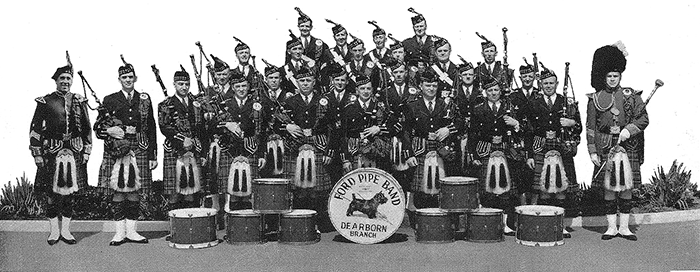
Thank you, Steve Thomson
We are grateful to reader Steve Thomson from Dumbarton, but now resident in Detroit, Michigan, for alerting us to this previously unknown piece of pipe band history. The Ford band is pictured above in 1939. The story is from ‘The Henry Ford’ an innovation and history project. It reads:
Celebrating St. Patrick’s
If you’re out celebrating St. Patrick’s Day you’re sure to hear the sound of the bagpipes. In America, you’ll most likely hear the Scottish Highland pipes, not the Irish Uilleann Pipes, but over the years the Highland pipes have been assimilated into Irish culture and it’s hard to pass a St. Patrick’s Day celebration without hearing the familiar strain of the pipers.
Past Ford Motor Company Sponsorship
And speaking of bagpipes, did you know Ford Motor Company sponsored its own pipe band in the 1930s and 1940s? Henry Ford was a lover of music, so it should come as no surprise that he sponsored a number of employee bands, one of which was a group of Scottish and Irish pipers and drummers.
The Ford Pipe Band, also known as the Ford Kiltie Band, was formed in 1932, with most of the members coming from the St. Andrew’s Pipe Band in Detroit.
How It Started
It started when Alexander Adams, the drum major, who was Edsel Ford’s bodyguard [Edsel Ford was Henry Ford’s only son and President of the company from 1919 until his death in 1943], began recruiting other members of the band to come work at Ford.
The Pipe Major, Hector McInnes, bass drummer, William Riddock, and pipers, James Cullen and Donald McPhee all worked in Plant Protection, with many of the other members working in departments across the company.
Ford sponsored the band and paid for all transportation and rooming, but the band had to pay for their own uniforms. Alec Bryce, one of the drummers, recalled that the band specially ordered their uniforms from Scotland and had them shipped to Ontario, bringing the uniforms into the U.S. piece by piece. A long process, but perhaps they decided it was worth the effort when the won Best Dressed Pipe Band at the Cowal Games in 1939.
Ford Motor Company provided members a practice space at the Highland Park plant, and gave the pipers and drummers paid time off for performances and competitions as well as credited work time for all travel.
First-Rate Musicians
The band consisted of first-rate musicians, many of the members had been regimental pipers and drummers in the Scots Guard during WWI and had continued to play in local bands in the Detroit area. During the peak of the band in 1934-36 as many as 20 pipers and drummers played for Ford Motor Company.
The band played all events and performances for free, and traveled across the United States and Canada for shows and competitions. They entertained Ford employees at the Ford Merit Club meetings, local parades, and other Ford events.
Addition Performances
In addition to performances, the pipers and drummers were top-notch competitors being named North American Champion Bagpipe Band for 1934, 1935 and 1936, winning 15 silver cups in open competition during 1934 alone. They also won both the American and All-Canadian championships in 1939.
The band took a break during World War II, but some of the members reformed the group when the war was over to continue the piping tradition at Ford with a new set of musicians. The band played in their first post-war major competition in 1948 and continued to place well in competitions all over the United States and Canada. They also played at Ford and Lincoln-Mercury sponsored events, parades, and Scottish games.
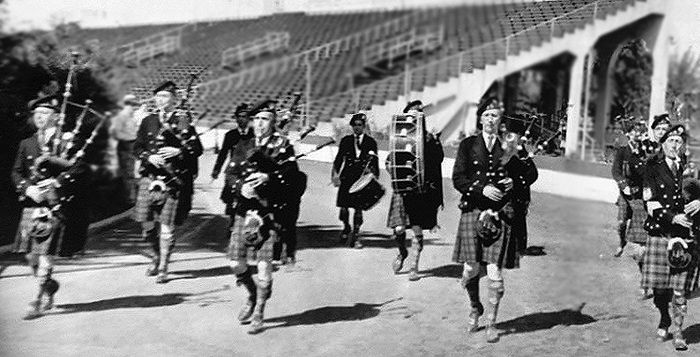
We are very grateful to Donald MacPhee, Gold Medallist, RSPBA Adjudicator and multiple Worlds winner with Field Marshal Montgomery, for this article and photographs detailing the important history of pipe bands associated with the booming motor industry in the US in the 1950s and 60s.
My grandfather Donald MacPhee was a member of the Ford Pipe Band and worked for the Ford Motor Company for over 30 years after emigrating from South Uist and serving with the Camerons in WW1.
My father, Sandy MacPhee, played with the Ford band as a youngster. Both my dad and grandfather were members of the Detroit Highlanders. There is a photo of the Detroit Highlanders above.
My grandfather is not in the photo but P/M George Duncan and P/Sgt Walter Rose are in their positions. The piper behind George Duncan is John Scott and the piper behind Walter Rose is my dad.
The other two pipers in the front rank are Roderick Morrison and Ernest Montgomery. Bass Drummer is Art Robilard and snare drummers Jim Kresge, Don Brooks and Ray MacKay. My dad taught in the Detroit area before moving to Dunedin, Florida, in 1974.
Donald MacMillan (South Uist, and composer of John MacDonald’s Welcome to South Uist) lived with my grandparents in Detroit for 18 months when he emigrated from Scotland to the USA. Whilst there Donald taught my dad when he was a boy. According to my dad Donald was an excellent player and he, Donald, taught in the wider Detroit area at this time too.
Detroit had a very strong Gaelic culture and they formed an association and called it The Lewis Society. As in many of America’s big cities then, immigrants formed their own communities; they felt more comfortable using their native language. (Even today in the big cities you can have the Jewish quarter, the Italian, the Polish, the Irish.)
Detroit had an automobile industry that was booming after WW1. There wasn’t much opportunity here in Scotland at that time and many families took the decision to cross the Atlantic in search of a better life.
My grandfather, Donald MacPhee, lived in Glasgow after the war and wanted to play with the Glasgow Police but was too short (5′ 8″) and to be a police officer in those days you had to be six feet tall. He played with the Glasgow Transport pipe band instead before emigrating to the USA in 1923.
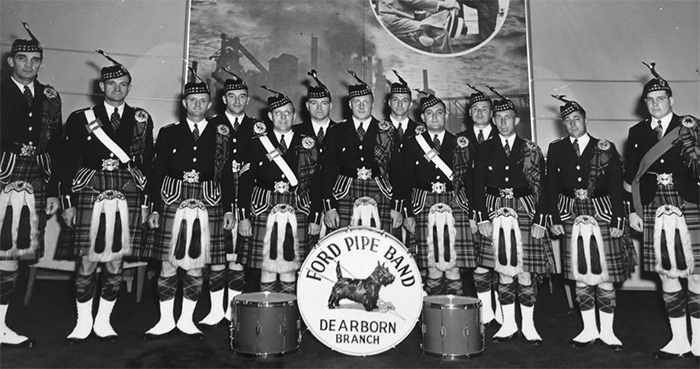
The Ford Motor company (which both of my grandfathers worked for) provided jobs and opportunity for many people.
Much later there was the pipe band the Chrysler Highlanders (Chrysler were another automotive maker) that was formed with students of my dad and Gordon Tuck. This band was later called the St Thomas (Ontario) Pipe Band and then the MacNish Distillery PB). I believe they competed in Scotland in the late 70s. I’m going on and on here but there you go. Here are a couple of photos of the the Chrysler band:
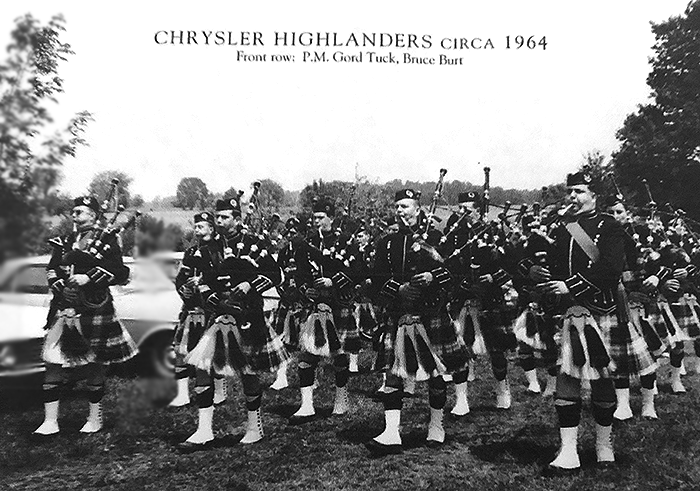
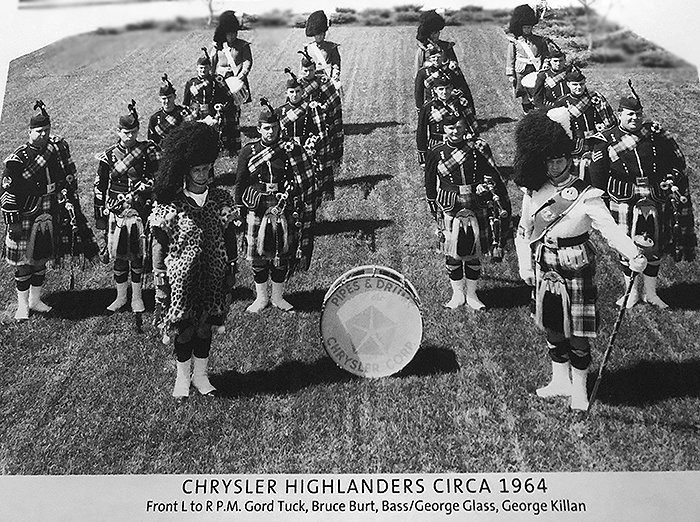
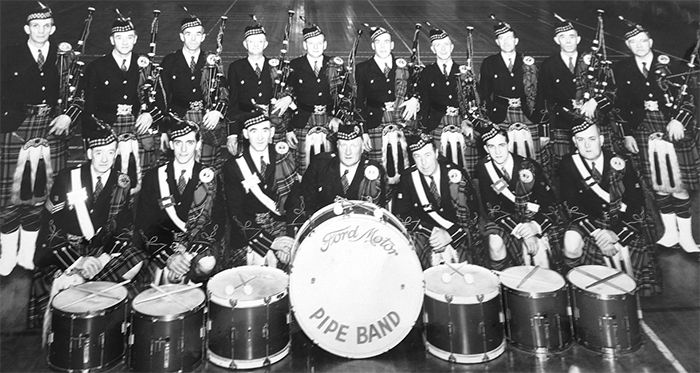
Above we have the Ford Motor Company pipe band – pipers l to r – are: P/M Hector McInnes, Bob Dobson, Bill Ferguson, Bill Christensen, Donald MacLelland, Hugh Millar, Jock MacPhail, Bill Ross, Donald MacDonald and my grandfather Donald MacPhee.
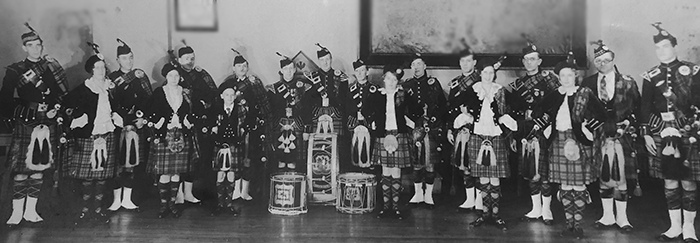
Above is one of the earliest of photos of the Ford Band with dancers (photo taken in St Andrews Hall). Pipers in this photo are, but not in order, Hector McInnes, Bob Dobson, Jimmy Cullen, Art McMechan, Bill Riddock, Harry Daniels, Malcolm McNaught, second from the right my grandfather Donald MacPhee and far right Alex Adams.
The oldest dancer in photo is Margaret Slessor (Killen). Yes, for those of you from the Detroit area, that is George Killen’s mom. George Killen was a student of my dad’s and a well-known piper and teacher in the Detroit area.